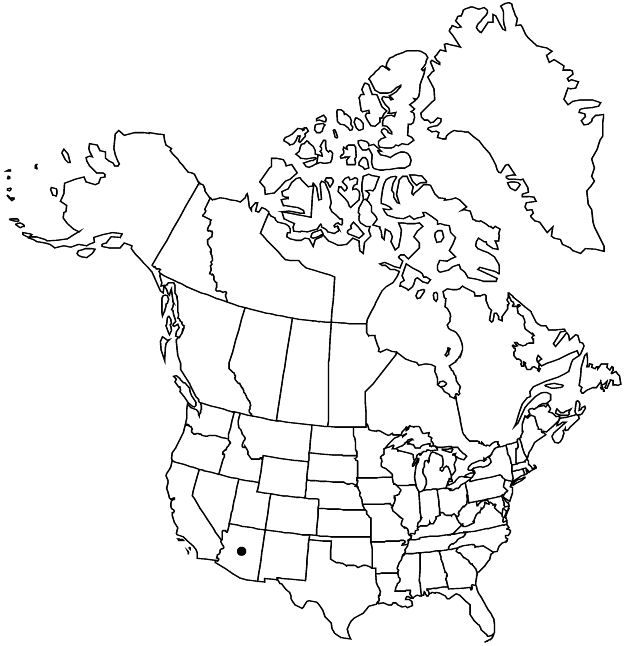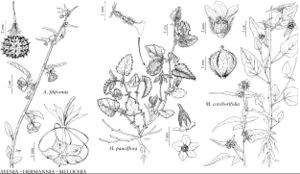Hermannia pauciflora
Proc. Amer. Acad. Arts 17: 368. 1882.
Plants 5–34 cm, sparsely [densely] stellate-pubescent to glabrescent and densely to sparsely capitate-glandular. Stems usually decumbent, rarely prostrate or erect, stellate-pubescent, conspicuously glandular. Leaves: stipule dimidiate-narrowly ovate or dimidiate-narrowly lanceolate, 2.5–5 × 0.5–2 mm, adaxially with simple, not stellate, hairs present; petiole 2–17 × 0.2–0.8 mm, glandular; blade red to red-rimmed adaxially, usually unlobed, rarely 2–4-lobuled basally, usually narrowly ovate to deltate, rarely widely ovate, 1–4 × 1–3 cm, base often rounded or truncate, rarely subcordate, margins usually dentate, sometimes serrate, terminal trichome at each tooth apex with 1 simple thin seta or setae 2-rayed, exserted to 2 times length of stellate trichomes of tooth sides, costal vein prominent adaxially, apex usually narrowly rounded or obtuse-rounded, rarely acute. Inflorescence subunits at leaf axils, 1 or 2-flowered, cymes probably strictly 2-flowered rather than solitary. Pedicels 1–3 mm. Flowers 6 × 6–12 mm fresh (when fully open), 6–10 mm wide dried; calyx 3.9–7 × 3.6–7.2 mm, stellate-hirsute, capitate-glandular hairs (0.4 mm) abaxially, adaxially glabrous within proximally, nectaries globular at calyx base and stamen base, tube 1–3 × 2.7–4.3 mm, lobes narrowly triangular, 1–2 mm wide, margins setose, apex acute, bristled, adaxially villulose, margin and apex trichome rays 1–3; corolla campanulate-rotate, aperture at midlength (fresh), petals spreading from erect base, yellow, orange basally, narrowly obovate, 6–8.2 × 2–3.6 mm, base clawed, claw not very distinct, narrowly obtriangular, 2.5–3.5 × 1–1.3 mm; lamina flat, slightly reflexed apically, apiculate base; ovary 2.5–3.4 × 1.8–3 mm, hirsute; gynophore 0.9–2 mm; ovules 4–10 per locule; styles connate completely, or distally or basally or completely distinct but contiguous in rehydrated specimens, or very distally distinct fresh, usually reflexed at apex, hirsutulous 2/3 of length, 1.7–3 mm; stigmas minutely recurved lobules, apices truncate, usually introrsely minutely few-papillate, rarely epapillate. Capsules stipitate, ellipsoid to oblong or obovoid, 10–20 mm, sparsely to densely stellate-pubescent; stipe 0.9–2 mm; valve margins undulate, exclusively and densely tuberculate, tubercles rigid, stout, columnar, 0.2–1.8 mm, stellate-pubescent along length, trichome at tubercle apex stellate-hispidulous, its trichome rays in one plane (spreading), compressed; fruit wall with exocarp membranaceous, mesocarp chartaceous, endocarp chartaceous, slightly sclerified, flexible, multifissured, calyx tube 1.7–3.5 mm wide in fruit; dehiscence loculicidal. Seeds 0–8 per cell, 1.4–1.9 × 1.3–1.6 × 0.8–1 mm, sinus linear-oblong, covered by narrowly transversely elliptic elaiosome; embryo arcuate (C-shaped); cotyledons oblong-elliptic, papillose, trichomes absent adaxially.
Phenology: Flowering and fruiting year-round.
Habitat: Desert scrub or grasslands, hillsides, rocky slopes, rock crevices, rocky soil, soil pockets, canyon bottoms, washes, rock outcrops, limestone, granitic, or talus soil
Elevation: 700–1300 m
Distribution

Ariz., Mexico (San Luis Potosí, Sonora, Tamaulipas).
Discussion
Of conservation concern.
Hermannia pauciflora is found in upland Sonoran desert scrub, in palo verde and saguaro cactus association of the Santa Catalina, Tucson, and Waterman mountains, and the San Pedro River floodplain in the Charleston Hills. Mexican collections are mostly from Sonora.
The flower illustration in H. W. Rickett (1966–1973, vol. 4, part 2, page 342) depicts petals erect, agreeing with the original description by S. Watson, and J. N. Rose (1897) described petals as “at most spreading”; photos sent by P. Jenkins (pers. comm.) show that distal petals above the pentagonal throat at midlength are almost flat when flowers are fully open, and anthers are included. Jenkins also reported the flowers to be attractive to cactus bees.
Selected References
None.
